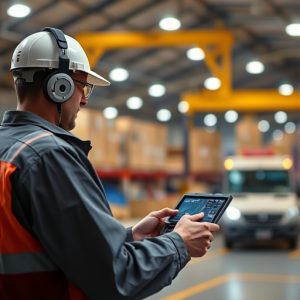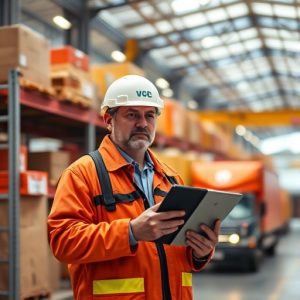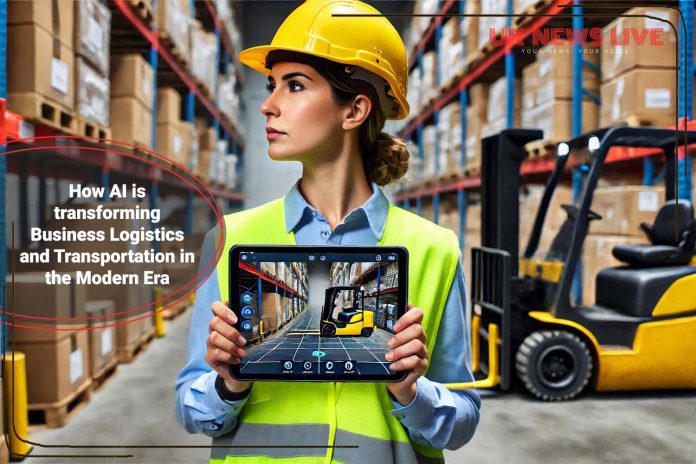Artificial Intelligence (AI) is no longer a futuristic concept; it’s a driving force in reshaping industries worldwide.
Among the sectors undergoing rapid transformation, logistics and transportation stand out. AI’s integration into these fields has redefined efficiency, cost management, and operational workflows, marking a new era of innovation.
But what exactly are the benefits and challenges of AI in this dynamic industry?
Benefits of AI in Logistics and Transportation

Using AI-powered logistics and transportation can offer many opportunities with the right resources and management.
1. Enhanced Efficiency and Automation
AI-powered tools are streamlining operations by automating repetitive tasks. For example, predictive analytics can forecast demand and optimize inventory levels, reducing waste and ensuring timely deliveries. Machine learning algorithms also power advanced route planning systems, enabling businesses to minimize fuel consumption and reduce delivery times.
2. Improved Supply Chain Visibility
Through AI, companies can achieve end-to-end visibility of their supply chains. Real-time tracking systems, powered by IoT devices and AI algorithms, allow businesses to monitor shipments and address potential issues proactively. This transparency improves customer satisfaction and strengthens trust.
3. Cost Reduction
Automation and optimization driven by AI reduce labour costs and operational inefficiencies. Autonomous vehicles, for instance, are revolutionizing last-mile deliveries by cutting down on human involvement and errors. Warehouse robots, guided by AI, handle sorting, packing, and loading tasks more quickly and accurately than their human counterparts.
4. Predictive Maintenance
AI technologies are pivotal in equipment maintenance. Predictive models can analyse patterns in machinery performance to identify potential breakdowns before they occur. This proactive approach minimizes downtime, prevents costly repairs, and enhances safety.
5. Personalised Customer Experience
AI-powered chatbots and virtual assistants improve customer service by providing instant support and accurate information. From answering queries about shipment statuses to offering tailored recommendations, these systems help build better customer relationships.
Challenges of AI in Logistics and Transportation

While the benefits are compelling, adopting AI also comes with some challenges that require consideration.
1. High Implementation Costs
Integrating AI technologies requires significant initial investment in hardware, software, and training. For small and medium-sized enterprises, these costs can be prohibitive.
-
Data Security and Privacy Concerns
With AI systems relying on massive amounts of data, ensuring the security of sensitive information is critical. Cybersecurity threats can disrupt operations and compromise customer trust if not addressed adequately.
3. Resistance to Change
Adopting AI often means restructuring traditional workflows and roles. Employees may resist these changes, fearing job displacement or the complexities of adapting to new technologies. Proper training and clear communication are essential to overcome these challenges.
4. Dependence on Data Quality
AI’s effectiveness depends on the quality of the data it processes. Incomplete, biased, or inaccurate data can lead to suboptimal outcomes, highlighting the need for robust data management practices.
5. Regulatory and Ethical Concerns
As AI-driven systems like autonomous vehicles become more prevalent, regulatory and ethical questions arise. Governments and industries must work together to establish clear guidelines and standards to ensure the responsible use of AI.
Real-World Applications of AI in Logistics
AI’s transformative potential is evident in real-world applications. Successful international companies like Amazon use AI for warehouse automation, ensuring faster order fulfilment and delivery. Similarly, logistics giants like DHL are leveraging AI-powered predictive analytics to optimize supply chain operations and improve customer satisfaction.
The Road Ahead
The future of logistics and transportation lies in the effective integration of AI technologies. From drone deliveries to self-driving trucks, the possibilities are endless. However, addressing challenges like data security, cost barriers, and ethical concerns will be key to ensuring sustainable and equitable growth.
AI is not just transforming logistics and transportation; it’s laying the foundation for a smarter, more connected world. Staying updated on emerging tech trends is key to utilising AI and other technologies as effectively as possible. Businesses that embrace this revolution will undoubtedly gain a competitive edge, ensuring their relevance in an ever-evolving marketplace.
































